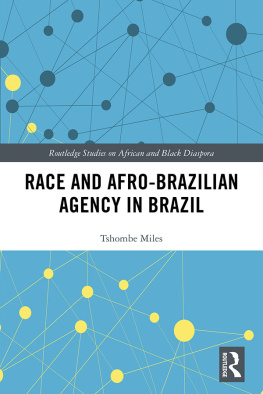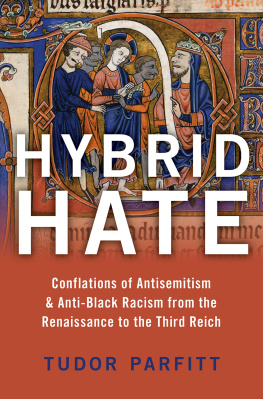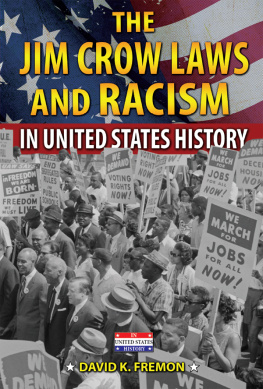RACISM

PRINCETON UNIVERSITY PRESS PRINCETON AND OXFORD
GEORGE M. FREDRICKSON
RACISM

A Short
History
Copyright 2002 by Princeton University Press
Published by Princeton University Press, 41 William Street,
Princeton, New Jersey 08540
In the United Kingdom: Princeton University Press,
3 Market Place, Woodstock, Oxfordshire OX20 1SY
All Rights Reserved
Library of Congress Cataloging-in-Publication Data
Fredrickson, George M., 1934
Racism : a short history / George M. Fredrickson.
p. cm.
Includes bibliographical references and index.
ISBN 0-691-00899-X (alk. paper)
1. RacismHistory. 2. Race relationsHistory. I. Title.
HT1507 .F74 2002
305.8009dc21 2001055191
British Library Cataloging-in-Publication Data is available
This book has been composed in Dante
Printed on acid-free paper.
www.pupress.princeton.edu
Printed in the United States of America
10 9 8 7 6 5 4 3 2 1

For
Donald Fleming,
mentor and
friend
CONTENTS

ACKNOWLEDGMENTS

In the course of carrying this project to fruition I have acquired many debts. To Professor Constantin Fasolt of the University of Chicago I owe the original suggestion that I write a short book on racism in world historical perspective. Although I did not in the end fulfill his hope that I would contribute such a volume to a series he edits, I would not have been emboldened to undertake something of this breadth without his initial encouragement. I want to thank the Princeton University Public Lectures Committee and Professor Nancy Weiss Malkiel, Dean of the Faculty, for inviting me to give the series of lectures on which this book is based. Brigitta van Rheinberg of Princeton University Press guided this work from the beginning and made valuable recommendations concerning structure and emphasis. Providing very helpful critiques of all or part of the manuscript at various stages of development were Benjamin Braude, Sean Dobson, John Cell, Norman Naimark, David Nirenberg, John Torpey, Eric Weitz, Howard Winant, and John Worth. These eminent scholars of course bear no responsibility for any errors that remain. David Holland provided invaluable assistance in helping me to prepare the manuscript for publication.
RACISM

INTRODUCTION

The term racism is often used in a loose and unreflective way to describe the hostile or negative feelings of one ethnic group or people toward another and the actions resulting from such attitudes. But sometimes the antipathy of one group toward another is expressed and acted upon with a single-mindedness and brutality that go far beyond the group-centered prejudice and snobbery that seem to constitute an almost universal human failing. Hitler invoked racist theories to justify his genocidal treatment of European Jewry, as did white supremacists in the American South to explain why Jim Crow laws were needed to keep whites and blacks separated and unequal.
The climax of the history of racism came in the twentieth century in the rise and fall of what I will call overtly racist regimes. In the American South, the passage of segregation laws and restrictions on black voting rights reduced African Americans to lower-caste status, despite the constitutional amendments that had made them equal citizens. Extreme racist propaganda, which represented black males as ravening beasts lusting after white women, served to rationalize the practice of lynching. These extralegal executions were increasingly reserved for blacks accused of offenses against the color line, and they became more brutal and sadistic as time went on; by the early twentieth century victims were likely to be tortured to death rather than simply killed. A key feature of the racist regime maintained by state law in the South was a fear of sexual contamination through rape or intermarriage, which led to efforts to prevent the conjugal union of whites with those with any known or discernible African ancestry.
The effort to guarantee race purity in the American South anticipated aspects of the official Nazi persecution of Jews in the 1930s. The Nuremberg Laws of 1935 prohibited intermarriage or sexual relations between Jews and gentiles, and the propaganda surrounding the legislation emphasized the sexual threat that predatory Jewish males presented to German womanhood and the purity of German blood. Racist ideology was of course eventually carried to a more extreme point in Nazi Germany than in the American South of the Jim Crow era. Individual blacks had been hanged or burned to death by the lynch mobs to serve as examples to ensure that the mass of southern African Americans would scrupulously respect the color line. But it took Hitler and the Nazis to attempt the extermination of an entire ethnic group on the basis of a racist ideology.
Hitler, it has been said, gave racism a bad name. The moral revulsion of people throughout the world against what the Nazis did, reinforced by scientific studies undermining racist genetics (or eugenics), served to discredit the scientific racism that had been respectable and influential in the United States and Europe before the Second World War. But explicit racism also came under devastating attack by the new nations resulting from the decolonization of Africa and Asia and their representatives in the United Nations. The civil rights movement in the United States, which succeeded in outlawing legalized racial segregation and discrimination in the 1960s, was a beneficiary of revulsion against the Holocaust as the logical extreme of racism. But it also drew crucial support from the growing sense that national interests were threatened when blacks in the United States were mistreated and abused. In the competition with the Soviet Union for the hearts and minds of independent Africans and Asians, Jim Crow and the ideology that sustained it became a national embarrassment with possible strategic consequences.
The one racist regime that survived the Second World War and the Cold War was the South African, which did not in fact come to fruition until the advent of apartheid in 1948. The laws passed banning all marriage and sexual relations between different population groups and requiring separate residential areas for people of mixed race (Coloreds), as well as for Africans, signified the same obsession with race purity that characterized the other racist regimes. However, the climate of world opinion in the wake of the Holocaust induced some apologists for apartheid to avoid straightforward biological racism and to rest their case for separate development mainly on cultural rather than physical differences. The extent to which Afrikaner nationalism was inspired by nineteenth-century European cultural nationalism also contributed to this avoidance of a pseudoscientific rationale. No better example can be found of how a cultural essentialism based on nationality can do the work of a racism based squarely on skin color or other physical characteristics. The South African government also tried to accommodate itself to the age of decolonization. It offered a dubious independence to the overcrowded homelands, from which African migrants went forth to work for limited periods in the mines and factories of the nine-tenths of the country reserved for a white minority that constituted less than a sixth of the total population.
Next page





